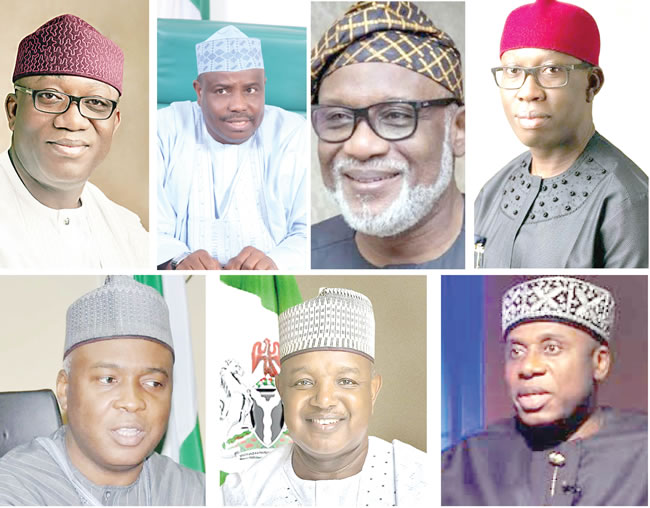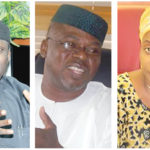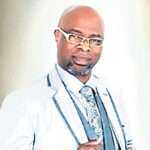The activities of regional and zonal political platforms appear to be threatening the status of the Nigerian Governors Forum (NGF) as a major bloc in the polity. KUNLE ODEREMI writes on the competing interests, capacity of the NGF to cope with those tendencies vis-a-vis its original objectives.
In its 20 years chequered history of existence, the Nigerian Governors Forum (NGF) has had seven chairmen. They include Alhaji Abdullahi Adamu (1999-2004) of Nasarawa State; Obong Victor Attah, (2004 – 2006) of Akwa Ibom State;Lucky Igbinedion of Edo State (2006-2007); Bukola Saraki (2007-2011) of Kwara State; Honourable Rotimi Amaechi (2011-2015) of Rivers State; Alhaji Abdulaziz Yari Abubakar (2015-2019) of Zamfara State and incumbent Dr Kayode Fayemi of Ekiti State. Apparently, the position of NGF chairman has oscillated among governors elected on the ticket of the two major parties dominating the nation’s political space. This is in spite of the fact that the Labour Party (LP) and All Progressive Grand Alliance (APGA) have also shared the privilege of having their candidates elected governors in states like Ondo and Anambra states.
Founded shortly after the birth of the Fourth Republic, the NGF had mesmerized the political space with style based on the pedigrees of its leadership at a point in time. By its own account, the history of the body was in two phases: 1999 to 2008 and 2009 till date. Under the first phase, activities of the NGF were marked by meetings and collection of annual dues for administrative expenses. The second phase started in 2007, when the then governor of Kwara State, Dr Bukola Saraki became NGF chairman. By 2011, the then Governor of Rivers State, Honourable Rotimi Amaechi took over, with Mr Peter Obi, Governor of Anambra State, emerging as the pioneer vice chairman. The promoters said NGF’s birth was not only expedient but imperative for the states to assert themselves and to collectively influence the nature and course of policies at the national level. It accentuated the claim to the fact that with the era of military dictatorship, “there was a clear need for states to re-assert themselves and exercise the level of independence that is the wont of a true federation. The body further justified its formation on the need states to regain their past glory of constituting a credible unit within the wider context of the federation, thereby removing the manifest distortion which militates against the realization of true federalism.
Precedents
There are precedents about governors cutting across different platforms forming a similar political bloc in the past. In the first Republic, governors elected on the ticket of the Unity Party of Nigeria: Lagos, Oyo, Bendel, Ogun and Ondo State otherwise called LOBOO States met on regional level. Ditto their counterparts of the National Party of Nigeria (NPN) extraction, just as those of the Nigeria Peoples Party (NPP) and the Peoples Redemption Party (PRP) respectively. And at the threshold of the 1983 general elections, the governors of UPN, NPP and others in opposition came together under the initiative of their party leaders, but which soon collapsed due to political chicanery and hypocrisy. In the aborted Third Republic, governors of the Social Democratic Party (SDP) and the National Republican Convention (NRC) established parallel forums for regular interventions, engagements and ego trips.
Governors in the zones, especially in the southern part of the country, also propped up political blocs to aggregate the wishes and aspirations of their areas. Prominent among them was that of the Alliance for Democracy (AD) governors from the South-West, who advanced the advocacy of restructuring and power devolution. The regional bloc was later expanded and branded a forum for southern governors, including PDP governors from the South-South and the South-East. And the last two meetings of the group brought back the memories of the intendment of the Southern Governors Forum at inception.
Wither NGF?
Lately, many have raised questions on the strength and capacity of the NGF in the light of increasing challenges posed by the plethora of regional groupings. The clamour for restructuring, ban on open grazing, activities of killer herdsmen, to name a few, remain unsettling and touchy. And the formation of regional groups by governors is perceived as whittling down NGF influence and capacity, place and role in the polity. There is the North-East Governors Forum; North-West Governors Forum; North-Central Governors Forum; side by side with the Northern Governors Forum (NGF). Besides, there are the Progressives Governors Forum; PDP Governors Forum; South-South Governors Forum and the South-East Governors Forum.
Gov Atiku Bagudu (PGF chair) of Kebbi State is the chairman of the Progressives Governors Forum; Governor Simon Lalong is in charge of the Northern Governors Forum; Governor Aminu Tambuwal, the head of the PDP Governors Forum, is said to be under pressure to renew the bid for presidency in 2023. Governor Dave Umahi of Ebonyi State leads the South-East Governors Forum; Governor Ifeanyi Okowa is the head of the South-South Governors Forum. The Niger State governor, Alhaji Abubakar Sani Bello, is the chairman of the North-Central Governors Forum,. Governor Rotimi Akeredolu, the chairman of the South-West Governors Forum; doubles as Southern Governors Forum. Governor Aminu Masari of Katsina State leads North-West Governors Forum; while the chairman of the North-East Governors’ Forum is Governor Babagana Zulum of Borno State,
The multiplicity of the bodies has created mutual suspicion, petty quarrel and antagonism among stakeholders, such as the antagonism that was witnessed between the governor of Rivers State, Nyesom Wike and his Cross River State counterpart, Ben Ayade. Such verbal confrontation and schism recently engaged the attention of former President Goodluck Jonathan, as he remarked that the NG Forum was the best platform to discuss issues affecting the country. “Governors themselves should continue to meet; I don’t really love a situation where the northern governors will meet, then the southern governors will cry foul. Then, the southern governors will meet, then the northern governors will cry foul; that will not help our country. The governors, through the governors’ forum, should meet; they are the people who run this country. The President is just one person in Abuja. The states, especially in a country where the local governments are very weak, it’s the states that people fall back to. So, if the governors of the states meet and dialogue, interrogate things that are good for this country, then we will move forward. I don’t really enjoy the antagonism between governors, they should come together and discuss,” Jonathan said.
Agenda
The roadmap of NGF is spelt out under vision and mission. Its mission is to be “a strong non-partisan institution which actively and effectively promotes inclusiveness, democratic values, good governance and sustainable development, while the mission is “to provide a platform for collaboration among the executive governors on matters of public policy; promote good governance, sharing of good practice and enhance cooperation at state level and with other arms of government and society. The NGF also said it is guided by three core values, among which are consensus building, establishing understanding through equal representation of the collective interests of all stakeholders, focusing on knowledge delivery on all objectives in its strategic plan.
NGF as pedestal
From all indications, each of the leadership of the NGF has used the platform to shore up his political standing and profile. They use the platform to prepare ground for presidential ambition, building structures, bridges across board, galvanizing support and rallying support for their ambition after leaving office. Apart from seeking for the office of the president of the country, others used the opportunity to erect structures that enabled them to pick plum positions in government or railroad the citizens to the leadership of the National Assembly.
Saraki
He is believed to have brought about major structural changes into the NGF as chairman. His role in the organization elevated his political profile in readiness for his quest for higher political responsibility and desire. Having been able to build bridges across board, he sought to be president. With politicians crisscrossing the land, there are reports that he plans to rev up the engine of that presidential bid again.
Attah
Victor Attah served for two terms of four years as governor of Akwa Ibom State. He sought the presidential ticket of the PDP for the 2007 election. A leading advocate of resource control, the trained architect was schemed out of the contest for the PDP ticket by the Obasanjo administration.
Amaechi
His meteoric rise in the political space was further bolstered by his emergence as the chairman of the NGF. A beneficiary of the intrigues that trailed the conduct of party primaries to become governor, Amaechi maintained a steady rise in profile through political engineering as the chairman of NGF. He was among the arrowheads of some leaders and former governors of PDP that dumped the party to collaborate in midwifing the APC and shepherding it to power in 2015. There are projections and counterpart projections over his next political journey after exiting as minister of Transportation in the Buhari administration.
Fayemi
Dr Kayode Fayemi is regarded as a leading member of the Think-Tank of the ruling APC. The former minister for solid minerals is on the last lap of his second term in office as governor of Ekiti State. There are speculations that he might throw his hat into the ring for the 2023 presidency.
What past leaders promised
Beyond the opportunity for peer review sharing, the secretariat of the NGF believes the pressure group has recorded a number of major strides over the years. Notable among those remarkable achievements, according to the body, is that it facilitated the release of excess crude funds (from Paris Club debts) to the States in 2008, paved the way for the adoption of the Doctrine of Necessity that broke the logjam over the recognition of Dr. Goodluck Jonathan as the Acting President and staved off danger during the ailment and absence of late President Yar’Adua in 2010 and that governors had become more technical on matters of good governance in measurable terms through the instrument of the State Peer Review Mechanism, which they have continued to leverage on as a platform for peer learning; constituted a sub-committee to look into the electoral reform-related issues and also liaise with the National Assembly to resolve any controversies in the reform.
In his capacity as chairman, Dr Saraki set the agenda for the NGF at its maiden retreat in 2007. He noted that the breakthrough of any nation could be traced back to a date, and a place; when and where individual actors, political elite, decide to re-examine themselves, question orthodox views, confront traditional challenges, create a new vision of society, and devise new ways of solving old problems. Thus, he said he and his colleagues were on the verge of making history.
Restating the declaration by the then President Umaru Yar’adua to ensure that by 2020, Nigeria became one of the 20 top economies in the world, Dr Saraki noted that “2020 is a mere 13 years away. But this is a task that must be accomplished. By the year 2020, our country will be 60 years old as an independent country. At 60, we must be prepared to claim our destiny; the destiny to stand tall and strong as the leader of the black race anywhere in the world. We have the ability and the resources to succeed. But we must back these with an iron resolve to achieve success. Our president has declared his commitment to provide the leadership that we need to drive the vision 2020. Yet, so much would depend on our own resolve to provide the inevitable complementary leadership. As the second tier of government in our federation, the intent and purpose of our existence is to bring governance closer to the people of our country. “Therefore, if the real impact of government is to be felt, we at the states must be prepared to deliver on the expectations of our people and possess the ability and the means to do so. It follows, therefore that if the people must enjoy the real benefits of our national resources, we must be prepared to devolve sufficient quotient of our national resources to the states, to enable us make the necessary investments in improving the lives of our people, especially in the areas of health and education.”
When he mounted the saddle, Amaechi, at the second retreat of the NGF held in Sokoto State, on November 16, 2013, said the challenges besetting the country could only be overcome if its leaders made conscious efforts to do the right thing at the right time. So, he said the time had come for he and other leaders to live up to the expectations of the electorate, as “our insecure population looks up to us for security and social justice.” At the third retreat hosted by the then Lagos State governor, Raji Fashola, Amaechi said the retreat underscored that critical milestones on the roadmap towards a greater Nigeria were devolution of more powers and functions, with the requisite fiscal empowerment and independence to the states; broader redefinition of national security, in line with Chapter II and Chapter IV of the 1999 Constitution (as amended) to ensure human security and environmental security; greater demonstration of, and commitment to transparency, ethics and accountability in governance; and transformative political leadership.” At the fourth retreat held on June 6, 2014, Amaechi waxed philosophical on the challenge before NGF members by quoting an American governor who once said: ‘’Govern to the end. Plough to the end of the row. Avoid the myth of ‘lame duck’. What you do in the last year or so may define or mar your governorship.’’
But he was worried about the emerging skepticism in the organisation, as he and most of his colleagues were at threshold of competing their tenure. He warned: “To my colleagues, as we prepare to bow out, I want us to reflect on the matter of the crack in the body of the NGF. Since it is our dream and aspiration to remain intact and grow together as one, regardless of any disagreements, the time to bring everyone back together is now. Our country and our people bear the biggest brunt of a fractured Forum.”
But has NGF been able to rise above rhetoric since its inception? What is the direct and indirect impact of the keen competition and rivalry posed by the plethora of forums articulating variegated issues and problems? However, the NGF says one of its greatest feats is the level of cooperation between states, which it claimed has increased significantly, even in terms of relation between states and the Federal Government. It said it amply evident during deliberations at the National Economic Council (NEC) meetings and interactions on many key national issues. The NGF said “zonal groupings, which mirror the Forum, are increasingly effective as they discuss ways of overcoming their commonly shared developmental challenges. In dealing with common problems, the Forum has become a respected platform of collaboration irrespective of party differences and economic strength,” it added. .
Nonetheless, some observers, including a former DG of NIMASA, Dakuku Peterside are of the view that the perception of northern governors on the core issues raised by southern governors at their recent meetings in Asaba and Lagos reflect a yawning gap in the NGF. In particular, Peterside declared in a piece titled Rumblings from the South; “The resolutions of the Southern governors and the divergent reactions from members of the National Assembly from different sections of the country reveal the deep-rooted conflict of perception and approach to the country’s problems from different country sections: It also brings to manifestation the primary North-South divide of our fault lines. The impression created is that while the South is pushing for some radical changes to solve the current Nigerian issues, the far North is unsettled and would prefer the status quo to remain.”
YOU SHOULD NOT MISS THESE HEADLINES FROM NIGERIAN TRIBUNE
We Have Not Had Water Supply In Months ― Abeokuta Residents
In spite of the huge investment in the water sector by the government and international organisations, water scarcity has grown to become a perennial nightmare for residents of Abeokuta, the Ogun State capital. This report x-rays the lives and experiences of residents in getting clean, potable and affordable water amidst the surge of COVID-19 cases in the state…
Selfies, video calls and Chinese documentaries: The things you’ll meet onboard Lagos-Ibadan train
The Lagos-Ibadan railway was inaugurated recently for a full paid operation by the Nigerian Railway Corporation after about a year of free test-run. Our reporter joined the train to and fro Lagos from Ibadan and tells his experience in this report…






